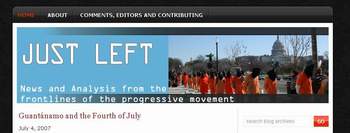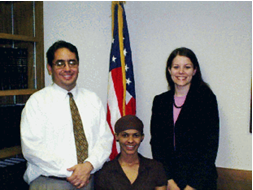Civil Liberties, Extraordinary Rendition, Guantanamo, Habeas Corpus, Human Rights, Targeting Muslims, Torture, Truth to Power
Podcast: Play in new window | Download


Laying the Foundation for a Police State – Part 1 – Building Blocks
Since July of 2004, Law and Disorder has brought Pacifica listeners the voices of activists, authors and attorneys from the front lines.
In the weeks to come, Law and Disorder hosts will examine in a four part series, the foundation for what many see as a police state in the United States. In this series they will talk with guests about the post 9/11 blueprint of this dictatorship/ police state and how the nefarious turn to war, the use of torture and the domestic propagation of fear unfolded.
Law and Disorder hosts have covered at length topics such as torture, domestic surveillance, criminalizing dissent, racial profiling, indefinite detentions and the destruction of constitutional rights as vital information to bring an understanding to listeners as to how it happened and where we go from here.
In this first series, the hosts begin with a look back at where they were on the day of September 11th, and how the Patriot Act was pushed through the Legislature immediately after the attacks on that day. They look at the racial profiling and roundup of Muslims and the rush to invade Afghanistan and Iraq using the Authorization for Use of Military Force.
Co-host Dalia Hashad describes her experiences as an attorney formerly with the ACLU right after September 11th as thousands of Muslim-Americans were rounded up or corralled because of their ethnicity or political affiliation.

Tracked in America – Samina Sundas
Samina Sundas with American Muslim Voice helped her fellow Muslims and Pakistani-Americans integrate into mainstream American society, and her role intensified after 9/11. When the National Security Entry-Exit Registration System (NSEERS, also known as the Special Registration program) was instituted in September 2002, Muslims all over the United States contacted her confused and worried about how it would affect them. She couldn’t get clear answers from federal immigration officials despite several meetings. After that, she set up an ad hoc hotline that has since become part of an organization called American Muslim Voice.



Framework of Police State laws since 9/11
Co-host Michael Ratner leads the way through the timeline from setting up the legal basis for a global war on terror to justifying a secret system of prisons and interrogation techniques that evade historic safeguards in the Geneva Convention.

Guest – Scott Horton, Chair of International Law Committee at the New York City Bar Association and adjunct Professor of Law at Columbia University. He is also the author of over 200 articles and monographs on legal developments in nations in transition.
—-
Law and Disorder Co-host Michael Ratner Launches Blog:Â Just Left

Civil Liberties, Habeas Corpus, Human Rights, Supreme Court, Targeting Muslims, Torture, Truth to Power
Podcast: Play in new window | Download

Alamo Car Rental – Discrimination Verdict
In our ongoing coverage of racial profiling and religious bias since 9/11, we go now to look at a case that ended in a big verdict for an employee who was fired for wearing a head scarf. Recently, a federal jury in Phoenix awarded more than 280 thousand dollars in a religious discrimination suit against Alamo Car Rental. The suit was brought by U.S. Equal Employment Opportunity Commission. Alamo Car Rental was charged on a post-9/11 backlash discrimination based on religion.
The case involved Bilan Nur, a woman of Somali descent who was let go from her customer service position in December 2001 after the Alamo car rental office she worked at in Phoenix refused to let her wear a headscarf to work.
Guest – Valerie Meyer, EEOC Attorney in Phoenix, Arizona.
Guest – Bilan Nur
—–

Verdict in Post 9/11 Roundup
Recently, the U.S. Court of Appeals for the Second Circuit ruled that former Attorney General John Ashcroft and FBI Director Robert Mueller may be sued from ethnic and religious discrimination after 9/11. Former detainee, Javaid Iqbal was among the hundreds of muslims rounded up after 9/11 being held in maximum security conditions after they were identified as being of high interest to the investigation.
Iqbal, a Pakistani Muslim, was arrested at his Long Island home on Nov. 2, 2001, and was charged with nonviolent federal crimes unrelated to terrorism. Two months later, he was moved to the Metropolitan Detention Center in Brooklyn, where he was held in solitary confinement for more than 150 days without a hearing, his lawsuit alleged.
The 2nd U.S. Circuit Court of Appeals in Manhattan recently recognized that Iqbal had the right not to be subjected to needlessly harsh conditions of confinement, the right to be free from the use of excessive force and the right not to be subjected to ethnic or religious discrimination.
Guest – Alex Reinert, Attorney and Law professor at the Cardoza School of Law.
———–
Law and Disorder Co-host Michael Ratner Launches Blog
Just Left

Civil Liberties, Death Penalty, Human Rights, Prison Industry, Surveillance
Podcast: Play in new window | Download



Help Stop The Execution of Troy Davis
Troy Davis was sentenced to death in Georgia, for the murder of a police officer. The case against him consisted entirely of witness testimonies that were full of inconsistencies, even at the time of trial. Since then, all but two of the states’ nine non-police witnesses from the trial have recanted their testimony. Many state in sworn affidavits that they were pressured or coerced by police into testifying or signing statements against Troy Davis. There is no physical evidence linking Troy Davis to the crime and no murder weapon has ever been found. With his appeals exhausted and courts refusing to consider the recanted testimony, Troy Davis is scheduled to be executed later this month. The only thing that stands between him and execution is the Georgia Parole Board.
Larry Cox, Executive Director of Amnesty International said “The Supreme Court decision is proof-positive that justice truly is blind — blind to coerced and recanted testimony, blind to the lack of a murder weapon or physical evidence and blind to the extremely dubious circumstances that led to this man’s conviction. At times there are cases that are emblematic of the dysfunctional application of justice in this country. By refusing to review serious claims of innocence, the Supreme Court has revealed catastrophic flaws in the U.S. death penalty machine.”
The Georgia Parole Board has scheduled Troy Davis to be executed on July 17th at 7pm. The first available day of a schedule window set from July 17-24.
Where is the justice for me? The case of Troy Davis facing execution in Georgia
Guest – Martina Correia, activist and sister of Troy Anthony Davis.
—–


Drug Policy Reform
Nearly 2.1 million Americans are currently serving time in prison. One out of every six of these inmates is in federal prison on marijuana.-related charges. Astonishingly, according to the laws in 15 U.S. states, one can receive a life sentence for non-violent marijuana infractions.
One out of every six of these inmates is in federal prison on marijuana-related charges.In large cities such as New York law enforcement officers have markedly stepped up their efforts to target low-level drug offenders, mostly for marijuana. Watch dog organizations claim that this is also a means to build a database on inner city youth, data shared and networked globally by several multi-national security agencies. In response to these sentencing disparities and the growing prison population, a drug policy reform movement is gaining momentum says Ethan Nadelman.
Guest – Ethan Nadelman, executive director of the Drug Policy Alliance

——————-
Civil Liberties, Human Rights, Supreme Court, Truth to Power
Podcast: Play in new window | Download


“Can Progressives Move the Democratic Party to the Left?”
This debate was sponsored by the Left Forum. Stanley Aronowitz, author of , and Laura Flanders, author of Blue Grit: True Democrats Take Back Politics from the Politicians discuss and debate the possibilities and limitations of working within the Democratic party. Moderated by Gary Younge is a columnist for The Nation and correspondent for The Guardian.

Stanley Aronowitz – Distinguished Professor of Sociology at CUNY Graduate Center. He is Director of The Center for the Study of Culture, Technology and Work. He is also the Founding Editor of Social Text and Situations, was Book Review Editor of Social Policy, and serves on the Editorial Board of Ethnography; Cultural Critique. He has authored and edited 24 books, the most recent being Left Turn: Forging a New Political Future.

Laura Flanders is the host of “RadioNation” heard on Air America Radio . She is the author most recently of Blue Grit: True Democrats Take Back Politics from the Politicians and also BUSHWOMEN: Tales of a Cynical Species, an investigation into the women in George W. Bush’s Cabinet.
———



Arguments Against the Dismissal of Lawsuits by Vietnamese Victims of Agent Orange/Dioxin.
Last week in New York City , a federal appeals court heard oral arguments in the lawsuits about the damage that plaintiffs say the herbicide Agent Orange did to American veterans to Vietnamese citizens during the Vietnam War.
Agent Orange, named for the stripes on the barrels that contained it was used to kill the vegetation that hid Viet Cong and North Vietnamese Army unites. It was found to be contaminated with the highly toxic substance, dioxin.



Veterans who believed they and their families had suffered from exposure to Agent Orange sued. In 1984, seven of the chemical companies settled for 180 million dollars but without accepting liability.
Some veterans not covered by the settlement filed further lawsuits but US District Court Judge Jack Weinstein dismissed them. In 2005, Weinstein also dismissed a suit brought by Vietnamese citizens claiming to have suffered from exposure to dioxin. He found that use of the toxic herbicide did not violate international norms.
Whatever the technical merits of Weinstein’s rulings, a dismissal without a trial is not a suibable outcome. A full trial, with all the scrutiny it can bring to bear on this question, would be a far more preferable closing act to this sad story, both for the American veterans and the Vietnamese civilians.



As the legal struggle continues, there have been bits of progress on cleaning up the mess. Though Washington recognizes some maladies as associated with Agent Orange and does pay some compensation, its contribution to alleviating the problem in Vietnam had been minimal until recently.
We hear the voices from those at the rally sponsored by Vietnam Agent Orange Relief and Responsibility Campaign. Many activists gathered outside the Federal Court to show their support during the oral arguments against the dismissal of lawsuit against companies (Dow, Monsanto) who profited from manufacturing these chemical weapons.
Civil Liberties, Extraordinary Rendition, Guantanamo, Habeas Corpus, Human Rights, Military Tribunal, Targeting Muslims, Torture, Truth to Power

Ali al-Marri Update: Reversing the Bush Administration’s War on Terror Policy
In a reversal of the Bush Administration’s effort to detain people around the globe, last week, a federal appeals court in Virginia, which is a very conservative court ruled that the government cannot subject Ali Saleh Kahlah al-Marri to indefinite detention, though he was subject to indefinite detention by a 2003 presidential order.


A legal US resident – though not a citizen – al-Marri had studied computer science at Bradley University in Peoria, Illinois in 1991, and returned on 10 September 2001 to pursue post-graduate studies, bringing his family – his wife and five children – with him. Three months later he was arrested and charged with fraud and making false statements to the FBI, but in June 2003, a month before he was due to stand trial for these charges in a federal court in Peoria, the prosecution dropped the charges and informed the court that he was to be held as an “enemy combatant†instead.
As some listeners may recall, here on Law and Disorder we’ve discussed Ali al-Marri’s case and how he was held incommunicado, indefinitely in a military prison without charges. He’s been in solitary confinement for more than 2 years, no access to reading material, except the Qur’an. According to his lawyers, he was constantly harassed, abused and any medical treatment he received was very poor.
Now, because the U.S. Court of Appeals for the 4th Circuit ruled that U.S. residents cannot be locked up indefinitely as “enemy combatants†without being charged, al-Marri can challenge his detention. Al-Marri is the only “enemy combatant” still in detention without charge in the United States itself.

Guest – Jonathan Hafetz, Litigation Director of the Brennan Center’s Liberty and National Security Project and the lead counsel for Al-Marri. He is the author of numerous articles in scholarly and popular publications, including the Yale Law Journal, California Western Law Review, and Fordham Journal of International Law, Legal Affairs, and the New York Law Journal.
——


Off the Record: U.S. Responsibility for Enforced Disappearances in the War on Terror
Children as young as seven years old detained in secret CIA prisons are some of the startling details unearthed by a recent report drafted by six human rights groups including Amnesty International (PDF file), the Center for Constitutional Rights and the Center for Human Rights and Global Justice at the New York University School of Law.
The report titled Off the Record: U.S. Responsibility for Enforced Disappearances in the War on Terror, details aspects of the CIA detention program that the US government has actively tried to conceal, such as the locations where prisoners may have been held, the mistreatment they endured, and the countries to which they may have been transferred. The report names 39 people believed to be disappeared from countries such as Egypt, Kenya, Libya, Morocco, Pakistan, and Spain.

Guest – Meg Satterthwaite, director of the Center for Human Rights and Global Justice at the (NYU) Law School. Satterthwaite has published reports and articles on human rights topics in scholarly and advocacy contexts. Her research interests include human rights in the “war on terrorâ€; gender, sexuality and human rights; and the human rights of migrants. She is Co-Chair of the International Human Rights Interest Group of the American Society of International Law, a member of the Board of Directors of Amnesty International USA, and a member of the International Law Committee of the City Bar of New York.
Podcast: Play in new window | Download


















